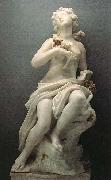La Peinture à l'huile en gros de Chine & Encadre |
|||||||||||

|
|||||||||||
|
|
|
||||||||||||||
|
|
||||||||||||||
|
||||||||||||||
|
|
||||||||||||||
| unknow artist
Clytie 1680s Marble, under life-size Galleria di Palazzo Reale, Genoa Parodi created a remarkable set of four statues for the garden of the Palazzo Durazzo in Genoa. Drawn from Ovid's Metamorphoses, his figures were conceived as pairs and shared an appropriately horticultural theme of flowers: one pair featured Clytie and Hyacinth, who were beloved of Apollo and changed into flowers after their death. The interest here is very much the process of transformation - Clytie into a sunflower, Hyacinth into the flower that bears his name. Although the subject matter is somewhat unusual, Parodi's models are even more remarkable, for he has adapted them from late works by Bernini in an entirely different context. Clytie is a witty parody of the master's Truth from his unfinished Truth Unveiled, and her sunflower is derived from the sun held by Bernini's figure, but Hyacinth follows the unexpected example of the Angel with the Superscription from the Ponte Sant'Angelo in Rome, an intensely spiritual meditation that could hardly seem less appropriate. Artist: PARODI, Filippo Painting Title: Clytie , 1651-1700 Painting Style: Italian , sculpture Type: mythological 1680s Marble, under life-size Galleria di Palazzo Reale, Genoa Parodi created a remarkable set of four statues for the garden of the Palazzo Durazzo in Genoa. Drawn from Ovid's Metamorphoses, his figures were conceived as pairs and shared an appropriately horticultural theme of flowers: one pair featured Clytie and Hyacinth, who were beloved of Apollo and changed into flowers after their death. The interest here is very much the process of transformation - Clytie into a sunflower, Hyacinth into the flower that bears his name. Although the subject matter is somewhat unusual, Parodi's models are even more remarkable, for he has adapted them from late works by Bernini in an entirely different context. Clytie is a witty parody of the master's Truth from his unfinished Truth Unveiled, and her sunflower is derived from the sun held by Bernini's figure, but Hyacinth follows the unexpected example of the Angel with the Superscription from the Ponte Sant'Angelo in Rome, an intensely spiritual meditation that could hardly seem less appropriate. Artist: PARODI, Filippo Painting Title: Clytie , 1651-1700 Painting Style: Italian , sculpture Type: mythological |
||||||||||||||
|
Related Paintings to unknow artist :. |
||||||||||||||
|
|
||||||||||||||
|
|
||||||||||||||
|
CONTACTER DES Etats-Unis |







